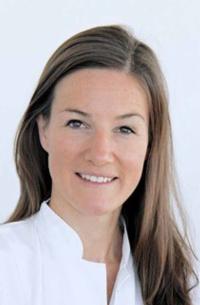UCSF Research on Knee Cartilage Degeneration Highlighted at RSNA 2017
 Research from a team lead by UCSF’s Alexandra Gersing, M.D., was highlighted in the RSNA Newsroom and through a scientific paper presentation on Tuesday, Nov. 28. The MRI study indicates that obese people who lose a substantial amount of weight can significantly slow the degeneration of their knee cartilage, but only if they lose weight through diet and exercise or diet alone.
Research from a team lead by UCSF’s Alexandra Gersing, M.D., was highlighted in the RSNA Newsroom and through a scientific paper presentation on Tuesday, Nov. 28. The MRI study indicates that obese people who lose a substantial amount of weight can significantly slow the degeneration of their knee cartilage, but only if they lose weight through diet and exercise or diet alone.
Obesity continues to be a major risk factor for osteoarthritis—a disease commonly found in the knee joint. "Once cartilage is lost in osteoarthritis, the disease cannot be reversed,” explains Dr. Gersing. Therefore, it’s important for people at risk of osteoarthritis or with early signs of the disease to slow the degeneration of cartilage through weight loss.
The study is directly related to knee degeneration research highlighted by RSNA in 2015. See more on the latest details and findings from the study:
- Researchers investigated the association between different degrees of weight loss and the progression of knee cartilage degeneration over 96 months in 760 men and women with a body mass index of greater than 25. The studied patients were from the Osteoarthritis Initiative, a nationwide research study focused on the prevention and treatment of knee osteoarthritis.
- Through T2 relaxation time measurements from MRI, changes in cartilage quality at a very early stage were visible, even before it breaks down.
- Substantial weight loss not only slowed knee joint degeneration—it also reduced the risk of developing osteoarthritis. However, the study found that cartilage degeneration was significantly lower in the patients who lost weight through diet and exercise or diet alone.
- Therefore, solely exercise as a regimen in order to lose weight in overweight and obese adults may not be as beneficial to the knee joint as weight loss regimens involving diet.
Co-authors on the study are Gabby B. Joseph, Ph.D., Benedikt J. Schwaiger, M.D., Charles E. McCulloch, Ph.D., Michael C. Nevitt, Ph.D., and Thomas M. Link, M.D., Ph.D.
See the full RSNA press release here.
